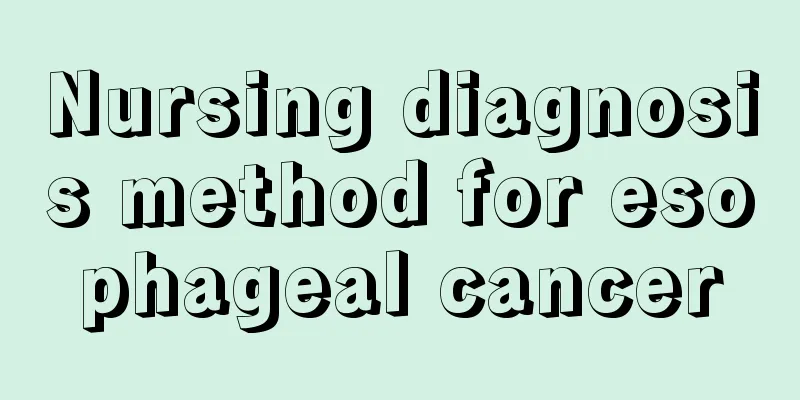Nursing diagnosis method for esophageal cancer

|
The causes and treatments of esophageal cancer are relatively complicated, so patients should detect it early and receive treatment as soon as possible. What are the diagnostic methods for esophageal cancer? If the patient is not particularly clear, the following introduction can help reduce diagnostic detours and determine the condition as early as possible. Let's learn about the nursing diagnosis of esophageal cancer. 1. Examination of esophageal function: Esophageal motility test: esophageal pressure measurement, suitable for patients suspected of esophageal motility disorder; acid clearance test, used to measure the peristaltic efficiency of the esophageal body to eliminate acid. Gastroesophageal reflux test: esophageal acid perfusion test; 24-hour esophageal pH monitoring; lower esophageal sphincter manometry test. 2. Esophageal exfoliated cytology examination: The esophageal exfoliated cytology examination method is simple, easy to operate, safe, less painful for patients, and the accuracy rate is over 90%. It is an important method for large-scale esophageal cancer screening. However, patients with bleeding and bleeding tendency of esophageal cancer or those with esophageal varices should not undergo esophageal cytology examination; patients with deep esophageal ulcers on esophageal cancer X-rays or those with hypertension, heart disease and late pregnancy should be cautious in esophageal cytology examination; patients with poor general condition and excessive weakness should improve their general condition before examination; patients with acute inflammation of the upper respiratory tract and upper digestive tract should control the infection before examination. 3. Differential diagnosis: In addition to medical history, symptoms and signs, the diagnosis of esophageal cancer depends largely on X-ray and endoscopic examinations, and the final diagnosis needs to be confirmed by histopathology. Esophageal cancer needs to be differentiated from benign and other malignant tumors of the esophagus. 4. X-ray barium meal examination: one of the diagnostic methods for esophageal cancer, it can provide reliable data for the study of early esophageal cancer. Combined with cytology and esophageal endoscopy, it can improve the accuracy of esophageal cancer diagnosis. X-ray barium meal examination of esophageal cancer not only determines the location, length and degree of obstruction of the lesion, but also determines whether the esophageal lesion has invaded and the scope of invasion. 5. CT examination: CT scan can clearly show the relationship between the esophagus and the adjacent mediastinal organs, but it is difficult to detect early esophageal cancer. Combining CT with X-ray examinations can help improve the diagnosis and staging of esophageal cancer. Generally speaking, patients can control their condition well through the above five diagnostic methods, thus helping doctors determine the treatment plan for the disease, allowing patients to control the progression of the disease as soon as possible, or even cure it. In addition, esophageal cancer patients must have enough confidence to fight the disease, and their family members can encourage them. |
<<: Early detection method for esophageal cancer
>>: Can esophageal cancer be diagnosed through gastroscopy?
Recommend
Discussing the causes of pancreatic cancer from the death of Steve Jobs
A piece of news shook the fragile nerves of the w...
Tests to confirm bladder cancer
In clinical practice, we cannot tell what the dis...
Why do women get cervical cancer? What should women do if they have cervical cancer?
Why do women get cervical cancer? Cervical cancer...
How to prevent family-clustered liver cancer? Experts have three suggestions for preventing family-clustered liver cancer
Clinically, many tumor diseases are hereditary. W...
There are needle-like bloodshot nails
Our hands and feet are very important to our huma...
Will drinking egg tea for breakfast make you fat
The so-called egg tea actually means beating an e...
Can I use pure milk to wash my face if I have acne on my face?
If you have acne on your face, although you can u...
What to do if you feel dizzy due to brain hypoxia
There are many cases of rhinitis in life. Patient...
What should I do if a small piece of my front tooth is broken
A small piece of the front tooth is usually broke...
Does it hurt to dissolve hyaluronic acid?
Hyaluronic acid is widely used in medical beauty....
Can malignant melanoma of the nose be cured?
Malignant melanoma of the nose is treatable, but ...
Can combing your hair cure gray hair?
Gray hair is a common phenomenon in life. When gr...
My hands are swollen, what's going on?
There are always some unexpected situations in li...
Eye drops that lower intraocular pressure
Eye drops are a common medicine in our lives. Eye...
The difference between menstruation and miscarriage
Menstruation and miscarriage are not unfamiliar t...









